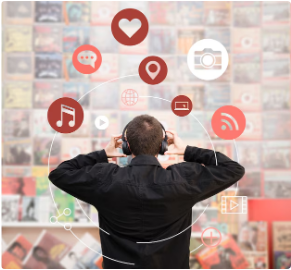Social media platforms have become a central part of modern life, profoundly influencing how people perceive and interact with the world. Algorithms, the underlying technology driving these platforms, play a crucial role in shaping the content users see and, consequently, their opinions and behaviors. This article explores the impact of social media and algorithms on public mindsets, examining both the positive and negative effects on society.
1. The Role of Social Media in Shaping Public Mindsets
Social media platforms, such as Facebook, Twitter, Instagram, and TikTok, have revolutionized communication by allowing users to connect, share, and access information globally. These platforms impact public mindsets in several ways:
- Information Dissemination: Social media serves as a primary source of news and information for many individuals. It enables rapid dissemination of information and can shape public perception by highlighting specific stories, events, or viewpoints. However, the accuracy and reliability of information can vary, leading to the spread of misinformation and fake news.
- Social Influence: Social media facilitates social influence by allowing users to see and interact with content shared by friends, family, and influencers. This exposure can affect users’ opinions, behaviors, and attitudes. For example, endorsements from celebrities or social media influencers can significantly impact consumer behavior and public opinion.
- Echo Chambers and Filter Bubbles: Social media algorithms often create echo chambers and filter bubbles, where users are exposed predominantly to content that aligns with their existing beliefs and opinions. This can reinforce pre-existing views and limit exposure to diverse perspectives, potentially leading to polarization and a narrowed worldview.
2. The Impact of Algorithms on Content Curation
Algorithms are the driving force behind content curation on social media platforms. They determine what content users see based on various factors, including user preferences, engagement history, and trending topics. The influence of algorithms on public mindsets includes:
- Personalization: Algorithms personalize content feeds to match users’ interests and engagement patterns. While this can enhance user experience by delivering relevant content, it can also limit exposure to diverse viewpoints and reinforce existing biases. Personalized content can create a feedback loop where users are continually exposed to similar ideas and opinions.
- Algorithmic Bias: Algorithms can unintentionally perpetuate biases present in the data they are trained on. This can result in the amplification of certain viewpoints or the marginalization of others. For instance, algorithms might prioritize sensational or controversial content because it generates more engagement, potentially skewing public perception.
- Manipulation and Influence: Algorithms can be manipulated to influence public opinion and behavior. For example, coordinated campaigns or misinformation can be spread through targeted ads and posts, exploiting algorithmic features to reach specific audiences and shape their views.
3. Positive and Negative Effects on Society
The influence of social media and algorithms on public mindsets has both positive and negative effects on society:
Positive Effects:
- Increased Awareness and Engagement: Social media can raise awareness about important social issues, movements, and causes. It provides a platform for marginalized voices and enables users to engage in activism and advocacy. For example, movements like #MeToo and Black Lives Matter have gained momentum through social media, highlighting critical social issues.
- Enhanced Connectivity: Social media fosters global connectivity, allowing individuals to connect with others who share similar interests, experiences, or goals. This connectivity can lead to the formation of supportive communities and collaborations across geographical boundaries.
- Educational Opportunities: Social media platforms can serve as valuable educational resources, offering access to a wide range of information, expert opinions, and learning materials. Users can engage with educational content and participate in discussions that broaden their knowledge and understanding.
Negative Effects:
- Misinformation and Fake News: The rapid spread of misinformation and fake news on social media can distort public perception and contribute to the spread of false information. This can have serious consequences for public health, safety, and democratic processes.
- Polarization and Divisiveness: Social media can exacerbate societal polarization by reinforcing echo chambers and filter bubbles. The algorithmic emphasis on sensational or divisive content can heighten tensions and contribute to societal divisions.
- Mental Health Impacts: Excessive use of social media and exposure to curated content can negatively impact mental health. Issues such as anxiety, depression, and body image concerns can arise from comparison with others and the pressure to present a curated version of oneself.
4. Addressing the Challenges
To mitigate the negative effects of social media and algorithms, several approaches can be considered:
- Promoting Media Literacy: Educating users about media literacy and critical thinking can help them discern credible information from misinformation. Encouraging users to verify sources and question the content they encounter can reduce the impact of false information.
- Enhancing Algorithmic Transparency: Increasing transparency around how algorithms work and how content is curated can help users understand the factors influencing their content feeds. Platforms can also provide options for users to customize their content preferences and control their exposure to certain types of content.
- Encouraging Diverse Content: Platforms can prioritize diverse and balanced content to counteract echo chambers and filter bubbles. By promoting a wider range of viewpoints and reducing the emphasis on sensational or divisive content, platforms can foster a more inclusive and balanced information environment.
- Supporting Mental Health: Addressing the mental health impacts of social media requires a holistic approach, including promoting healthy usage habits, providing support resources, and fostering a positive online environment.
Conclusion
Social media and algorithms have a profound impact on public mindsets, shaping how individuals perceive and interact with information. While these technologies offer significant benefits, including enhanced connectivity and increased awareness, they also pose challenges related to misinformation, polarization, and mental health. By promoting media literacy, enhancing algorithmic transparency, encouraging diverse content, and supporting mental health, we can address these challenges and harness the positive potential of social media and algorithms for a more informed and connected society.











